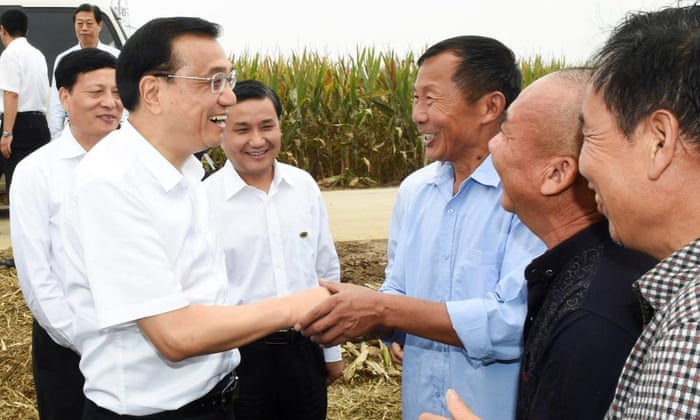China punishes 249 officials for laziness during corruption crackdown
Some officials have preferred to dither over approvals for major projects so as to avoid scrutiny, leading to sackings, demotions and warnings
 Li Keqiang talks with villagers during an inspection of farmland in Changge city this month. The premier has repeatedly criticised officials for laziness. Photograph: Xie Huanchi/Xinhua/Corbis
Li Keqiang talks with villagers during an inspection of farmland in Changge city this month. The premier has repeatedly criticised officials for laziness. Photograph: Xie Huanchi/Xinhua/Corbis
Tuesday 29 September 2015
China has punished 249 officials for laziness, exemplified by failure to spend government funds, delays to projects and sitting on land earmarked for development, the state news agency Xinhua has reported.
Spooked by China’s biggest ever crackdown on corruption, many officials in the past 18 months have preferred to dither over approvals for major projects so as to avoid drawing scrutiny.
That has annoyed Beijing, which has scolded procrastinating local governments for their laziness and repeatedly threatened to punish them by recalling their untouched budgets.
Xinhua said the 249 officials in 24 provinces, regions or cities had been sacked or given administrative demotions or warnings after an investigation running from the end of May until the middle of June.
Listing some of the most telling examples, Xinhua said a food recycling project in the northern province of Shanxi had yet to start construction in May this year, even though the government had released funds for it in 2012.
“The aim of holding these people accountable is to promote work and manage the issue of laziness in government and doing nothing … and ensure this year’s economic targets are on track,” an unidentified official was quoted as saying.
Xinhua said unspent funds of 296bn yuan (£30.6bn) seized by the government by the end of August had mostly already been invested in “urgent” development projects and to improve people’s livelihoods.
It was not immediately clear if this figure was the same as the sum of 300bn yuan in seized funds announced by the cabinet last week. The government has previously said unspent funds would be invested as soon as possible.
The Chinese premier, Li Keqiang, has repeatedly criticised officials for being slack and lazy in pushing through Beijing’s policy directives. China’s economy appears set this year for its weakest performance in at least a quarter of a century, putting global investors and policymakers on edge.
A plunge in China’s stock market over the summer and a surprise devaluation in the yuan currency have upset global markets, stirring doubts about the government’s ability to manage the economy.
